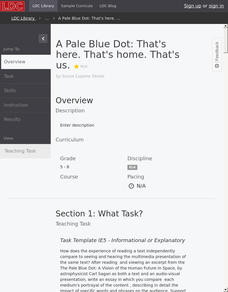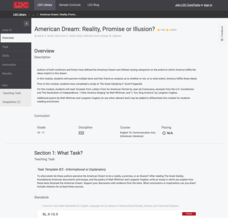New Mexico State University
Bad Date
Get the best ratio for a good date. The class watches a video where dates are rated based on the ratio of words spoken. Pupils then use the ratios in the video along with other given ratios to find equivalent ratios. Finally, they...
Collaborative for Academic, Social, and Emotional Learning (CASEL)
Examples of Social and Emotional Learning in Elementary Mathematics Instruction
A 12-page document lists an abundance of math-related activities that boost social and emotional topics; self-awareness, self-management, social awareness, relationship skills, and responsible decision making.
Radford University
Rocket Quads
How high will it fly? Pairs build straw rockets and launch them at different angles and determine the height and horizontal distance of the flight path. Teams make conjectures about how the angle affects the measured distances and use...
Indiana Department of Education
Social Emotional Toolkit
Looking for some tools to help you incorporate social and emotional learning into your curriculum? Then check out this 79-page kit packed with ideas for developing social-emotional learning competencies. The first section provides...
Radford University
Projectile Motion and Quadratic Functions
Model the flight of a ball. Small groups collect time data for how long it takes to toss a ball between two people. The teacher leads a discussion about projectile motion to get the class thinking about how to calculate the equation of...
PBS
Frankenstein: The Consequence of Creation
Famous as a horror story, as the first science fiction novel, Frankenstein is also a tale of ambition, a warning about unbridled science, and responsibility for actions. Readers consider what the tale says of the consequences of creation...
PBS
Character vs. Society in The Invisible Man
Ralph Ellison's Invisible Man is difficult to read and difficult to teach. The novel is so highly regarded that it is one of most often listed as an option for the AP Literature and Composition exam. The materials in this packet from PBS...
Literacy Design Collaborative
A Pale Blue Dot: That's Here. That's Home. That's Us.
21st-century learners live in such a visual world that many are unused to letting their minds imagine the picture that words create. An excerpt from Carl Sagan's lecture, "The Pale Blue Dot: A Vision of the Human Future in Space,"...
Steve Spangler Science
Halloween Dry Ice Secrets
Want to use dry ice in your classroom this Halloween but you're not sure how? A thorough packet of 13 dry ice activities showcases engaging ways to bring chemistry to life this October.
IPA Productions
A Christmas Carol - The Story
Thirty-six pages familiarize scholars with the story and vocabulary of A Christmas Carol by Charles Dickens. After reading and listening to an abbreviated version of the holiday tale learners show what they know about the sequence of...
PBS
To Kill a Mockingbird Teacher's Guide
If you're planning a unit on To Kill a Mockingbird by Harper Lee, don't pass this resource by! It includes thorough discussion questions and vocabulary from the novel, research opportunities, and writing prompts to extend learning...
Pace University
Grade 6-8 Living Things
What characterizes a living thing? Scholars explore the concept during a differentiated instruction unit on living things. They perform lab experiments to determine how animals adapt to stimuli, watch videos and learn about...
Cornell University
Polymers: Instant Snow
Is it easy to make snow? Scholars use critical thinking skills as they investigate the concept of polymers by making snow. The class tests several different variables and takes measurements over the course of several days. They then...
Echoes & Reflections
Jewish Resistance
Resistance to the Holocaust took on many forms. Learners explore the passive and active resistance of Jewish people who continued their practices and observances, as well as organized resistance against the evils of the Nazis. An...
Echoes & Reflections
The "Final Solution"
Nazi policies shifted from deportation and imprisonment to extermination of the Jewish people in death camps in the "Final Solution." Learners examine photos of artifacts, read poetry written by survivors, analyze testimony from...
Echoes & Reflections
Survivors and Liberators
The end was just the beginning. The period immediately after the end of World War II and the Holocaust is often called "The Return to Life" as survivors looked to reunite and recreate broken families and shattered lives. A two-lesson...
Echoes & Reflections
Nazi Germany
The Holocaust was an evolution of anti-Semitism, scapegoating, and targeted violence against Jews with Nazi policies. A resource unpacks the escalation in violence, along with the erosion of democratic institutions, during the 1930s....
Echoes & Reflections
The Children and Legacies Beyond the Holocaust
Using video testimony, primary source documents that detail international agreements, and structured discussions, learners consider the precarious position of children during the Holocaust and other international conflicts, and how to...
Echoes & Reflections
Rescuers and Non-Jewish Resistance
What does it mean to be a rescuer during the time of the Holocaust? Learners consider the role of those who resisted the Nazi invasions, including hiding Jewish people, throughout Europe. Activities include listening to the testimony of...
Echoes & Reflections
The Ghettos
Young historians examine primary sources, including diaries, poems, and photographs, to consider the conditions in the ghettos and how they fit into the escalation of the Third Reich's plot against the Jewish people.
Echoes & Reflections
Studying The Holocaust
While many young scholars are familiar with the Holocaust, they may not understand the specific history that led to the unprecedented atrocity. The first lesson in the unit helps teachers gauge their pupils' background knowledge. A...
Literacy Design Collaborative
American Dream: Reality, Promise or Illusion?
Dream or nightmare? Class members craft a synthesis essay with textual to determine to what extent the United States has fulfilled the ideas embodied in the America Dream.
Benjamin Franklin Tercentenary
Franklin’s Fair Hand American Journalism
Scholars know him for his role in the American Revolution, but Ben Franklin was also a journalist and printer. Learners investigate his standards for what was fit to print using primary sources—including writings where Franklin explains...
The New York Times
Evaluating Sources in a ‘Post-Truth’ World: Ideas for Teaching and Learning about Fake News
The framers of the United States Constitution felt a free press was so essential to a democracy that they granted the press the protection it needed to hold the powerful to account in the First Amendment. Today, digital natives need to...

























